Understanding Fortune Cards: History and Insights


Intro
Fortune cards are more than just interesting pieces of art or simple games; they serve as tools for personal introspection and growth. Rooted in diverse cultures, the use of these cards stretches back centuries, intertwining with astrology and various spiritual practices. This exploration seeks to shed light on how these cards can enhance our understanding of ourselves and the universe around us.
As we delve deeper, it becomes vital to unpack the layers of meaning embedded within the fortune card practices. From uncovering historical origins to dissecting their roles in modern-day astrology, every facet contributes to our overarching understanding of these compelling tools. Readers may find, for example, that their interpretations are not merely mystical exercises but offers reflections on real-life experiences and personal challenges.
By understanding how fortune cards serve specific functions amidst the cosmic dance of the stars, we can better appreciate their practical applications. Whether you're a seasoned astrologer, a curious esotericist, or simply someone looking for deeper insight, this article provides an informative journey into the world of fortune cards, combining theoretical knowledge with hands-on guidance.
"Cards are not just for fortune-telling; they serve as mirrors to our soul, reflecting our choices and potential."
Let’s embark together on this journey to decode the significance of fortune cards, understanding their intricacies and ultimately discovering their place in our daily lives.
Prelims to Fortune Cards
The allure of fortune cards lies not only in their mysterious symbolism but also in their historical roots and the guidance they can provide in personal growth. Fortune cards serve as a bridge between the conscious and the unconscious mind, offering insights that can sometimes elude everyday thought. Recognizing the relevance of fortune cards can empower individuals, enriching their journeys as they navigate the complexities of life.
Importance of Topic
Understanding fortune cards goes beyond their aesthetic appeal or associated rituals. They are tools steeped in tradition and insight, reflecting various beliefs and philosophies throughout history. By delving into the intricacies of these cards, readers can appreciate the diverse methodologies that inform interpretations and readings.
- Benefits
- Considerations
- Personal Insight: They provide a means to explore one's emotions and thoughts.
- Decision-Making: Fortune cards can enhance clarity during times of uncertainty.
- Cultural Connection: Many cultures employ these cards in unique ways, contributing to a rich tapestry of practices.
- Interpretation Complexity: Different cards can yield varying meanings depending on the context, making understanding vital.
- Subjectivity: Each reader brings their personal touch to the interpretation, which can lead to unique insights for each querent.
Understanding these cards requires an open mind and a willingness to engage with them on a deeper level, while also providing a platform for educated discussions among practitioners. As we move through the various aspects of fortune cards, we will find ourselves enriched by the historical contexts and diverse types of cards that have emerged over the centuries.
Types of Fortune Cards
When it comes to the world of fortune cards, understanding the different types can significantly level up one’s reading practice and personal exploration. Each system offers unique insights, rich histories, and varied applications. By familiarizing with these types, enthusiasts can navigate their potential and decide which system resonates most deeply with their personal journey. The types discussed here provide a platform to explore spiritual wisdom, personal intuition, and practical approaches that collectively enhance one’s fortune-telling experience.
Tarot Cards: A Brief Overview
Tarot cards, a classic representation of fortune cards, are deeply embedded in Western esotericism. Consisting typically of 78 cards divided into the Major and Minor Arcana, they serve as a mirror reflecting the complexities of human experience. The Major Arcana captures significant life processes, like The Fool or The Tower, whereas the Minor Arcana portrays everyday events and relationships.
Understanding tarot requires both knowledge and intuition. Readers often find themselves weaving together the meanings of individual cards with the surrounding context during a reading. The imagery and symbolism embedded in each design evoke personal interpretations, thus enhancing the reading experience. This makes tarot cards not merely tools for divination, but also a canvas where the reader’s intuition dances with the visual power of the cards.
Oracle Cards: Flexibility and Interpretation
Unlike the structured format of tarot, oracle cards offer much more flexibility, allowing a diverse range of themes and purposes. With no fixed number of cards or standardized meanings, oracle decks can be tailored to specific interests. For example, one might come across decks focusing on nature, angels, or specific emotional states.
The beauty of oracle cards lies in their intuitive responsiveness. Readers can choose how to interpret these cards, often seeing them more as prompts rather than definitive answers. This unique characteristic enables individuals to draw upon their personal insights and emotions, cultivating a more profound interaction with the cards. The adaptability of oracle cards allows a broader audience to engage with them, making them suitable for practitioners of all experience levels.
Lenormand and Other Systems
Lenormand cards represent another fascinating system of fortune cards that diverges from both tarot and oracle methodologies. With just 36 cards, Lenormand decks are markedly straightforward and often focus on concrete situations rather than abstract concepts. Pioneered in the 18th century by Marie Anne Adelaide Lenormand, these cards emphasize clarity and simplicity in readings.
Readers typically interpret Lenormand cards in pairs or combinations to foster a narrative, creating a story that reflects the querent's life. Unlike tarot, which can explore psychological themes, Lenormand tends to deliver direct messages, ideal for those seeking practical guidance. Other systems, such as playing cards or the Kipper cards, also exist and provide varied methodologies, enriching the tapestry of fortune-telling traditions.
"Understanding different types of fortune cards opens avenues to various interpretations and practices, allowing a deeper dive into personal insights and growth."
The Art of Reading Fortune Cards
Reading fortune cards is an intricate dance of intuition, skill, and personal insight. It is essential to grasp the nuances of this practice, as it not only shapes the experience of the reader but also deeply affects the querent, or the person seeking guidance. When engaging with fortune cards, one is not merely deciphering symbols or following a set ritual; rather, it is about opening a portal to deeper understanding. The reader’s intention and energy can transform a simple card draw into a profound exploration of self, circumstances, and potential futures.
Key elements to consider when reading fortune cards include:
- Sensitivity and connection: Tuning into the energy of the cards involves more than technique; it requires a certain depth of emotional and spiritual sensitivity.
- Mindset preparation: Approaching the reading with a focused mind can greatly enhance the quality of the insights gained.
- Flexibility in interpretation: Each card may have multiple meanings depending on the context and the energy surrounding the querent at that moment.
The benefits are abundant, as effective readings can help forge a path toward greater self-awareness and clarity, facilitating pivotal life decisions.
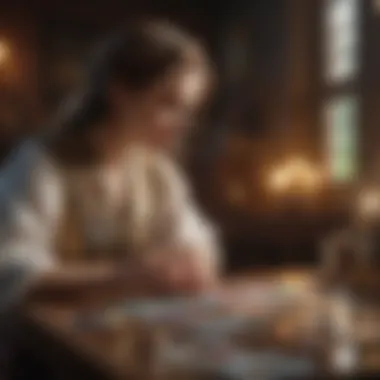
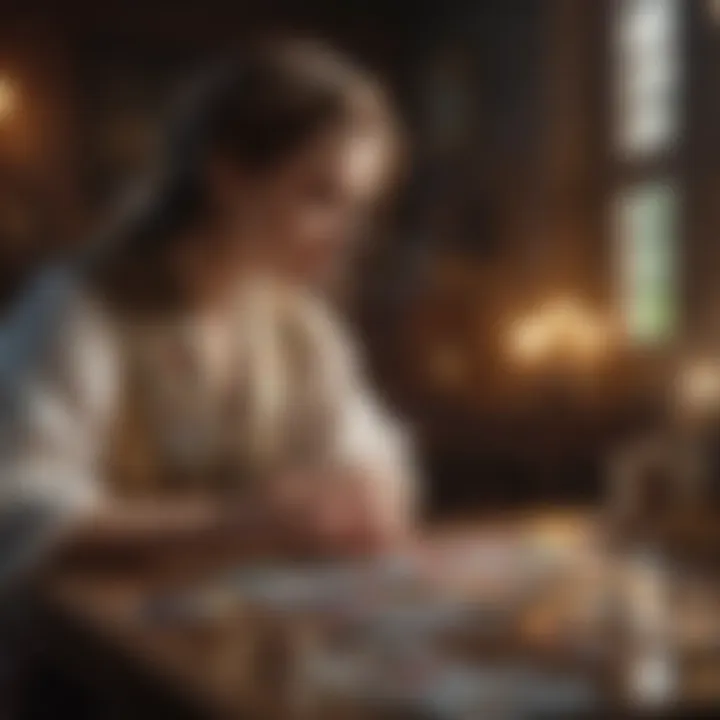
Preparation for a Reading
Before even laying down a single card, preparation for a reading is crucial. Establishing a conducive environment can set the tone for the entire session. The space should be comfortable, quiet, and free of distractions, ensuring that both the reader and the querent can focus.
Consider the following steps for preparation:
- Set an intention: It can be beneficial to clarify what one aims to achieve through the reading. This helps in directing the energy and setting a mindset conducive to openness and insight.
- Cleanse the energy: Many readers use rituals or methods to clear the energy of the deck, such as smudging with sage or even just giving the cards a gentle shake and shuffle.
- Grounding: Engaging in grounding exercises, such as deep breathing or visualizing energy flowing through the body, can align the reader and the querent energetically.
Throughout this process, it is about creating a sacred atmosphere that respects the seriousness of the work at hand.
Shuffling and Drawing Techniques
Shuffling and drawing techniques are more than mere physical actions. These practices are vital in channeling energy into the cards, influencing the reading's outcome. Each movement is a sacred act, allowing the querent's essence and questions to merge with the cards.
Common methods include:
- Overhand shuffle: This technique allows for a more organic mix of the cards. The reader can focus on the querent’s energy as they shuffle, feeling for subtle cues that guide the process.
- Riffle shuffle: Often seen in traditional card play, this method can yield a mix that feels tangible and random. However, it may not suit every reader's intuitive style.
- Cutting the deck: After shuffling, cutting the deck allows the querent an active role, possibly enhancing the personal connection with the reading.
When it comes to drawing, consider the how and the why: Are you drawing cards one by one, or laying them out in a spread? Each method can provide different levels of insight.
Interpretation Practices
Ultimately, interpretation practices guide what the cards mean in relation to the querent’s life or question. Rather than simply recounting the conventional meanings found in a guidebook, effective readers will integrate their intuition and the unique energy of the moment.
Key strategies for interpretation include:
- Contextual reading: Look at how cards relate to each other within a spread. For instance, if the Tower appears alongside the Star, it suggests a disruption followed by healing, radically changing its meaning.
- Use of symbolism: Each card is a rich tapestry of images, colors, and archetypes. Paying attention to these details can spark insights that dig deeper into the querent's psyche.
- Storytelling approach: Frame the reading as a narrative, weaving together the cards and their meanings to create a coherent story that resonates with the querent’s experience.
In summary, reading fortune cards is not merely about precision or rote memory; it transcends to a place where intuition, preparation, and technique converge to illuminate paths not easily seen. Looking at each element critically deepens the understanding and can amplify the impact of any reading.
The Role of Intuition in Readings
Intuition plays a pivotal role in the art of reading fortune cards, acting like a compass that guides readers through the often murky waters of interpretation. It is this internal sense—an inherent knowledge that transcends logic and reasoning—that facilitates a deeper connection with the cards. Connection formed by intuition allows for the readings to transcend mere symbolism and experience leaps of understanding that can sometimes feel truly revelatory.
Intuitive insights can lead to greater accuracy and depth in a reading. By tapping into one’s instincts and subconscious mind, a reader may find themselves drawn to particular cards or nuances that might not immediately register on a cognitive level. This aspect of fortune reading transforms what may begin as a checklist of meanings into a fluid exploration of possibilities and personalized insights.
Developing Intuitive Skills
Developing intuitive skills is less of a chore and more of an art form that requires practice and dedication. One excellent method is through mindfulness practices, as they create space to quiet the mind and foster an awareness of internal cues. Simply sitting in stillness for a few moments a day can sharpen perception, making it easier to recognize intuitive nudges when they arise during a reading.
Additionally, keeping a journal devoted to both readings and personal thoughts can yield insights that are often overlooked in the hustle and bustle of everyday life. This can be achieved by documenting how you felt during readings, noting when you experienced a gut feeling, or observing patterns in what resonates with you or others.
Another useful tactic is to experiment with different tarot or oracle spreads. Engaging actively with a variety of spreads can heighten your adaptability and willingness to mix things up. Shift your approach, for example, by asking a question of the cards that aligns with an emotional or relational aspect of life. Through repeated experimenting, one can truly cultivate a richer reservoir of intuition.
Listening to Inner Guidance
Listening to one's inner guidance is crucial in tailoring the message derived from fortune cards. This listening is not just about hearing; it involves an active engagement with instinctive thoughts, feelings, or impressions. As a reader delves into the meanings behind cards drawn, they must be attuned to what resonates—not merely relying on textbook interpretations but trusting one's gut reactions.
When a question or scenario is presented, and the cards are drawn, there can be a conglomeration of thoughts that begin to form. It is essential to sift through these initial responses, focusing on what feels most significant. Is there an image or symbol that stands out? Does a particular card evoke memories or sentiments that seem pertinent? These are often indications of guidance that should be regarded and, for some, may call for further investigation away from the table.
To amplify receptivity to inner guidance, consider methods like deep breathing techniques before a reading, allowing clarity to wash over the mind. Practicing gratitude or visualization can enhance the connection to intuitive insights, easily bringing forward an inner knowing during readings.
"Intuition is the whisper of the Soul, often drowned out by the chatter of the mind."
So, as readers incorporate their inner voice into their practice, they not only enhance their skill but also fortify the ethical nature of their readings, ensuring that each engagement with the cards is authentic and meaningful. Understanding and employing both intuition and thoughtful guidance can universally elevate the reading experience, tapping into the unseen forces that shape our paths.
Cultural Perspectives on Fortune Cards
Understanding the cultural perspectives surrounding fortune cards provides a broad context for their significance in various societies. The way these cards are interpreted and utilized can differ greatly depending on cultural heritage, beliefs, and societal norms. Exploring these differences enriches our understanding of fortune cards' multifaceted roles and emphasizes the personal and communal dimensions of their use.
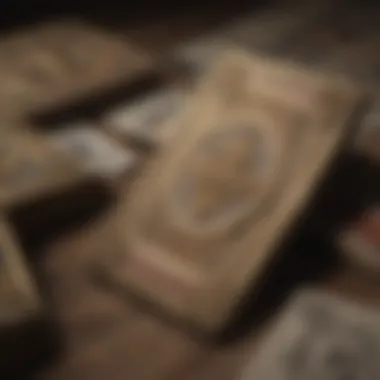
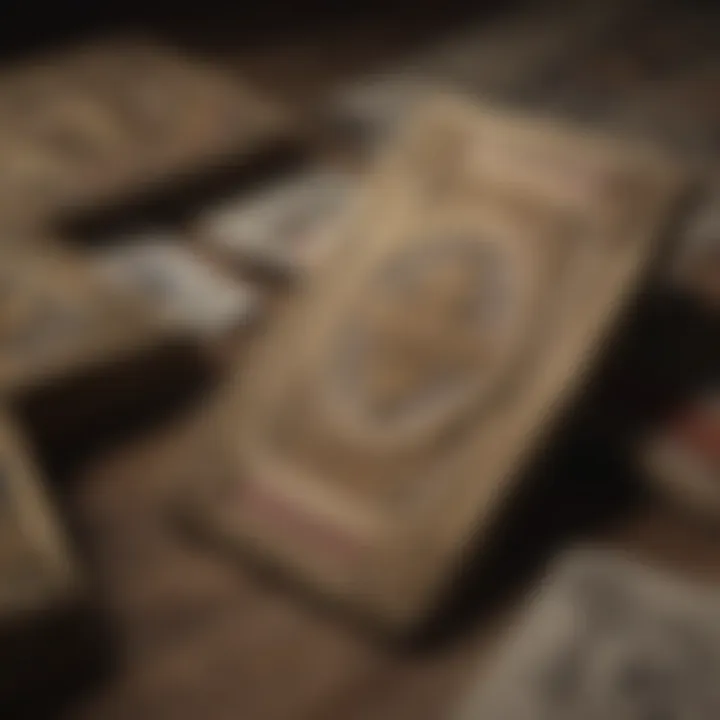
Western versus Eastern Traditions
When contrasting Western and Eastern traditions in relation to fortune cards, one quickly notices a striking divergence in their approaches and applications. In Western contexts, particularly with Tarot cards, there’s a strong emphasis on individualism and personal introspection. Western practitioners often prioritize self-reflection and psychological insight when interpreting the cards. This approach is deeply rooted in the narrative of the hero's journey, a concept familiar to many due to its prevalence in literature and personal development theories.
In contrast, Eastern traditions tend to interlace fortune cards with a communal and spiritual aspect. For example, in many Asian cultures, oracle cards may be viewed as instruments for collective rather than solely individual insight. The interpretations are often influenced by philosophies such as Taoism or Buddhism, where the focus may lean more towards harmony and interconnectedness rather than personal gain.
Interestingly, while Western readers might structure their card readings around questions or issues defining the individual’s path, Eastern practices may involve broader inquiries. Such inquiries could pertain to the overall well-being of family or community, reflecting deeper societal values.
"Cultural perspectives significantly shape 어떻게 fortune cards are seen and used. Understanding this allows for a richer interaction with the cards themselves."
Indigenous Practices with Fortune Cards
Indigenous cultures also offer a unique lens through which to view fortune cards. The uses and meanings may vary widely but generally encapsulate a deep connection to nature and ancestral wisdom. Many Indigenous practices utilize cards not only for personal guidance but as a means of storytelling and cultural preservation.
For instance, certain tribes may craft their own decks, embedding symbols and narratives significant to their cultural heritage. This not only creates a bridge to the past but also fosters community and identity. When readings are performed, it serves not just as a personal inquiry but as a means of linking with ancestral spirits, thus enriching the experience with collective wisdom.
Moreover, the interpretation of these cards is often viewed through the lens of community, where shared experiences and histories inform the guidance received. Thus, fortune cards become conduits for deep collective understanding rather than simply tools for personal insight.
In summary, the cultural perspectives on fortune cards reveal vast and diverse practices that reflect their significance beyond mere divination. From the Western emphasis on personal introspection to the Eastern focus on communal harmony, and the rich traditions of Indigenous practices, fortune cards present a tapestry of meaning that continues to evolve across various cultures. Understanding these nuances enhances one's appreciation of fortune cards as tools not just for insight, but as vessels of cultural and spiritual richness.
Practical Applications of Fortune Cards
Fortune cards serve not only as mystical tools but also as profound means for self-reflection and guidance. For those involved in astrology or personal insight, exploring the practical applications of fortune cards can reveal layers of meaning that directly influence daily life. Incorporating these cards into one’s routine can heighten awareness, illuminate choices, and enrich experiences. Let’s unfold several crucial areas where fortune cards find their relevance and utility in enhancing one’s journey through life.
Personal Growth and Self-Discovery
We live in a fast-paced world where it’s easy to lose touch with our inner selves. Fortune cards act as mirrors, reflecting our thoughts, feelings, and life situations. By engaging with these cards, individuals often experience revelations about their strengths, weaknesses, and desires. Using cards during personal reflection can enhance introspection.
- Perception of Self: Reading cards can give insights that help in understanding personal motivations and obstacles. For instance, drawing the The Fool card may prompt someone to evaluate areas in their life where they feel stuck or ready to take a leap into the unknown.
- Goals Alignment: By interpreting the meaning of the cards drawn, practitioners can dissect personal goals and desires, guiding one towards their true aspirations. For example, if someone draws The Empress, it might highlight the importance of nurturing creativity or relationships.
This journey into self-discovery provides a sandbox environment to explore emotions, create actionable strategies for change, and cultivate a deeper understanding of oneself.
Enhancing Decision-Making
Making decisions can often feel like walking through a maze, complete with blind alleys and unexpected turns. Fortune cards provide an additional layer of clarity and perspective that can inform decision-making processes. They do not replace logical thinking but instead complement it.
- Gaining Perspective: When faced with a choice, drawing a few cards can reveal different aspects or consequences of that decision. The drawn cards serve as conversational prompts with oneself, leading to a clearer understanding of risks and rewards. If one draws Justice, it could indicate the need for fairness in the decision or a sign to seek balance in outcomes.
- Weighting Options: When multiple paths lie ahead, consulting the cards may highlight which option resonates best with one’s values. The cards engage intuition, allowing for an internal dialogue that might otherwise remain unspoken.
Ultimately, using fortune cards as a decision-making tool can help individuals access their subconscious thoughts, guiding them towards choices that feel aligned with their authentic selves.
Guidance for Relationships
Relationships, whether romantic, familial, or platonic, often require astute navigation through complex emotions and expectations. Fortune cards can play an invaluable role in this, offering insights into dynamics and potential future interactions.
- Understanding Dynamics: Drawing relationship-focused cards can unveil underlying issues or highlight areas needing attention. For example, if one pulls the Two of Cups, it may be an affirmation of mutual appreciation and connection, encouraging deepening bonds.
- Communication Enhancement: The cards may also guide how to effectively communicate needs or boundaries within relationships. Considering cards related to communication, like The Page of Swords, might inspire approaches that foster dialogues rather than conflicts.
This unique aspect of fortune cards creates a bridge for connecting on deeper levels within relationships, enhancing emotional intelligence and facilitating intentional interactions.
"Fortune cards are more than mere symbols; they are gateways to understanding the self and navigating life’s complexities."
By integrating these practices, individuals can utilize fortune cards as tools for transformation and growth, unlocking their potential for self-discovery, decision-making, and relationship enhancement.
Common Misconceptions
When it comes to fortune cards, there are plenty of misconceptions floating around. Clearing these misconceptions is crucial, especially for those who are just dipping their toes into the world of card reading. Understanding the differences between fortune cards and common stereotypes can enhance how one approaches this practice. Misunderstandings can lead people to dismiss fortune cards as mere entertainment or even harmful, which couldn't be further from the truth.
Fortune Cards versus Fortune Telling
One of the most prominent misconceptions is that fortune cards are synonymous with fortune telling. While both practices involve divination, they are different in purpose and application. Fortune telling often implies predicting future events with exact precision, where the reader may claim to foresee a tangible outcome. It’s a more rigid and linear interpretation, which can create unrealistic expectations.
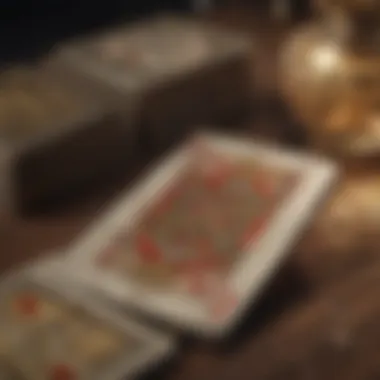
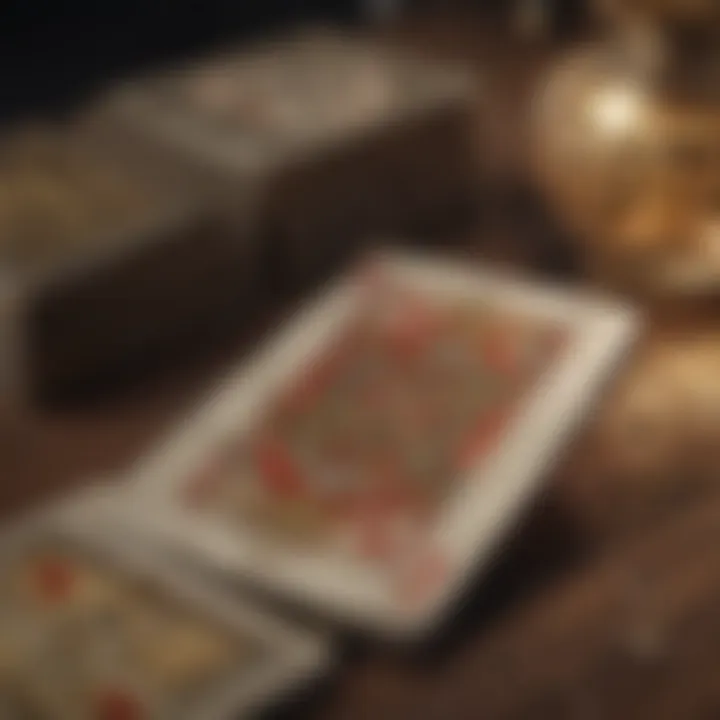
On the other hand, fortune cards are tools for exploration and self-reflection. They provide insight into personal circumstances and offer guidance that can help individuals think deeply about their choices. For instance, a card drawn in a reading might prompt someone to evaluate their priorities, rather than simply announcing, "You will find a job next month."
When people confuse these two, they may miss out on the insightful nuances that fortune cards can provide. Instead of merely waiting for a prophecy to come true, practitioners are encouraged to engage in a dialogue with their inner selves, using the cards as a mirror to reflect their intuition and thoughts.
Debunking Myths around Card Readings
Another layer of misconceptions surrounds the act of reading fortune cards itself. Many believe that only gifted individuals can understand and utilize these cards. This myth perpetuates the idea that card reading is an esoteric art reserved for a select few, which discourages others from exploring their own abilities. In reality, anyone can learn to read fortune cards, with enough practice and dedication. Adopting a hands-on approach often reveals that one’s innate intuition is more powerful than previously thought.
Furthermore, there's the notion that card readings can predict specific, unchangeable events. This belief can lead individuals to a fatalistic mindset, thinking that they are powerless in the face of future events. It’s essential to shift this mindset and recognize that the cards serve as a guide, rather than a deterministic forecast.
"Fortune cards are like compasses; they point you in a direction but leave the choice of the path entirely up to you."
By challenging these misconceptions, individuals can engage in fortune card readings with a clearer understanding of their potential. Whether you are looking for personal growth, clarity in relationships, or simply a bit of guidance on your journey, fortune cards can be an invaluable resource. Ultimately, the key is to view them as a helpful tool rather than an absolute measure of fate or fortune.
Ethical Considerations in Card Reading
As with any practice that involves personal insight, understanding ethical considerations in card reading is paramount. Incorporating these ethical practices into fortune card readings not only enhances the experience for the querent but also ensures that the reader operates with integrity. It's vital to remember that fortune cards cannot dictate fate but can provide insights that guide decision-making and personal growth. Therefore, ethical readings help build trust and respect between the reader and the querent, making the session more meaningful for both parties.
Respecting Boundaries
When entering the realm of fortune card readings, respecting personal boundaries is not just an afterthought; it's essential to create a safe and supportive environment. Readers should always remain mindful of a querent's comfort zone. It is crucial to allow the querent to express their needs and concerns openly. Some clients might be seeking validation, while others may desire clarity on a painful situation. Here are some practical ways to ensure boundaries are respected:
- Ask before delving deeper: Before probing into sensitive topics, readers must ask for permission. This can help the querent feel more secure in what can be a vulnerable situation.
- Clarify the purpose of the reading: Being upfront about the intentions of the reading can prevent misunderstandings and create a transparent atmosphere.
- Evaluate emotional responses: If a querent becomes visibly upset or anxious, it's crucial to check in with them, adjusting the approach as needed to ensure they feel safe.
Considering these factors can contribute to a positive experience for both the reader and the querent. Establishing a mutual understanding from the outset encourages open communication and respect.
The Reader-Querent Relationship
The dynamic between the reader and the querent is as significant as the cards themselves. This relationship is built on trust, and it's the reader's responsibility to foster this connection to provide accurate insight. Within this context, several elements come into play:
- Being non-judgmental: Readers should approach each session without preconceived notions about a querent's situation or choices. This impartiality contributes to an open and honest exchange.
- Confidentiality: Maintaining confidentiality is fundamental. Issues or experiences disclosed during readings should never leave the session, solidifying a querent's trust.
- Providing honest feedback: Readers must communicate insights sincerely, even if the information seems uncomfortable. However, this should always be balanced with care and sensitivity.
Building a solid reader-querent relationship creates a foundation for deeper insights and a more impactful reading experience. As readers align themselves with ethical guidelines, they elevate their practice while empowering querents to explore their paths with confidence.
"To navigate the complex waters of human interactions, one must always extend respect and understanding as the helm of their practice."
By being aware of these ethical considerations, fortune card readers not only honor their craft but also uplift those they serve, promoting a harmonious exchange that transcends mere predictions.
Ending: The Value of Fortune Cards
Fortune cards hold a unique place in the realms of astrology, divination, and personal introspection. They are more than mere tools for predictions; they are facilitators for self-discovery and reflection. As individuals navigate life’s complexities, the insights derived from these cards can provide clarity and guidance that resonates on a deeply personal level.
Reflecting on Personal Insights
Engaging with fortune cards allows individuals to tap into their subconscious. When a reader interprets the symbolism behind each card, it often triggers personal memories or emotions. For instance, a card depicting the Moon might evoke feelings of intuition and mystery, leading the querent to contemplate their own inner conflicts or aspirations. This process is not merely about foretelling the future; it's also about unveiling personal truths.
Many enthusiasts find that keeping a journal of readings presents an enlightening experience. Documenting insights can highlight patterns in one’s life, emphasizing themes that may require attention, like recurring anxieties or dreams.
- Benefits of Reflecting:
- Heightened self-awareness
- Consistent mental processing of emotions
- Deepening trust in one's intuitive judgments
This practice transforms the cards from simple visuals into mirrors, guiding individuals toward their inner landscapes. It compels them to confront issues they might otherwise neglect. The process of reflecting on these insights reassures the individual that they have the tools to navigate life’s unpredictability.
Future of Fortune Cards in Astrology
As society increasingly values mental well-being and self-care, the role of fortune cards continues to evolve. With advancements in technology, such as digital readings and social media platforms, tarot and oracle cards are becoming more accessible to a global audience.
- Integration of Technology:
- Cultural Inclusivity:
- Mobile apps for daily card draws
- Interactive online communities, such as discussions on reddit.com, provide a space for sharing and learning.
- A growing interest in diverse card systems, like Lenormand, enriches the cultural tapestry of fortune cards.
- Upcoming generations are likely to create a blend of traditional and modern interpretations, leading to innovative practices.
As the fascination with astrology gains momentum, fortune cards are likely to remain at the forefront as a means of exploration and understanding. Their accessibility ensures that they are not just relegated to the realm of mysticism but are embraced as legitimate tools for guidance and clarity.
In summary, the significance of fortune cards is profound, intertwining personal insight with a glimpse into the future. Much like a skilled astrologer interprets the stars, drawing from the wealth of experience found in fortune cards encourages both individual growth and a deeper understanding of one’s life path.







